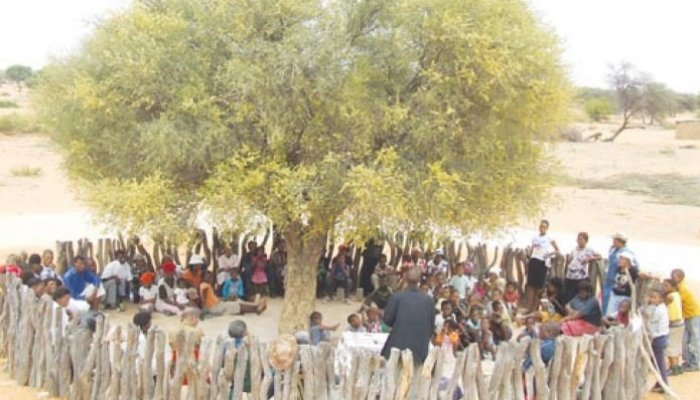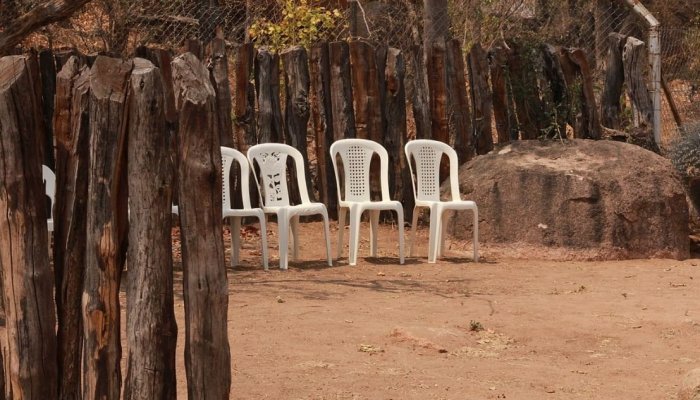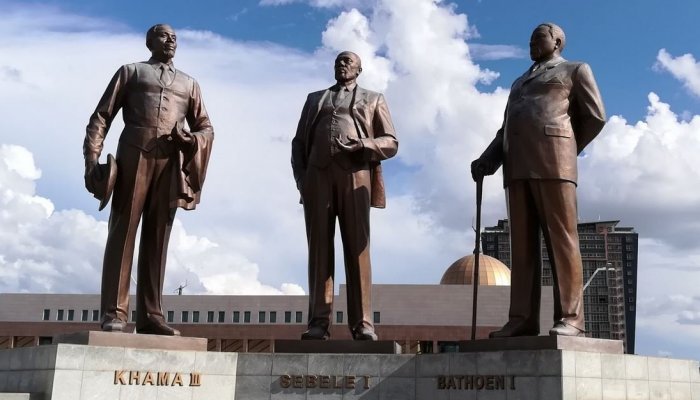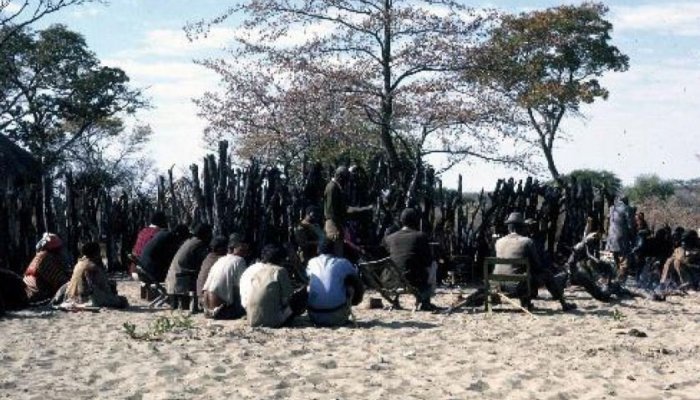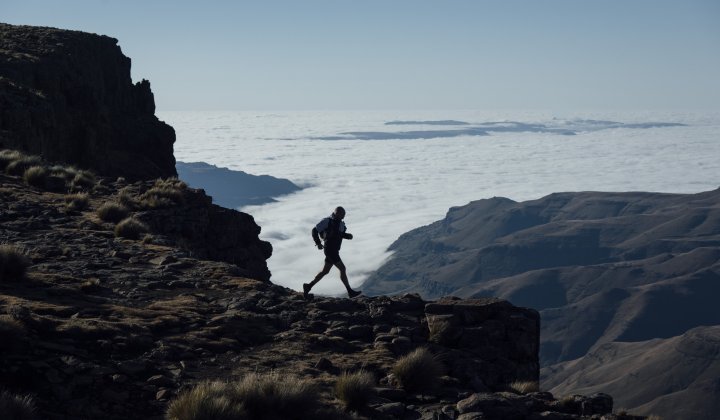“If you want to go fast, go alone. If you want to go far, go together” is perhaps the best-known African proverb. The wisdom of leading together is embodied in many traditions of the continent. We believe these traditions have much relevance for how to foster greater unity and innovation in the modern world. In this article, we explore a set of practices – kgotla (together), tirisano (working together), and mafisa (helping each other) – that form part of the social and leadership fabric of Botswana. They have enabled Botswana to prevail and prosper in times of war and peace. There is a saying in Tswana, “Letlhaku le lesha le agelwa mo go le legologolo”, meaning that what is new should be built on a strong foundation of Tswana practices for development. This applies to leadership, business and personal life.
Kgotla simply means ‘a meeting place’, but it stands for much more. It is a way to give a community the opportunity to participate in problem-solving and decision-making and limit the powers of the elders. Long ago, the Batswana (people of Botswana) created the kgotla so everyone could discuss and debate matters important to the community. Tswana laws and customs ensure that every person belongs to a ward and that each ward has its own kgotla. These hubs feed into the main kgotla, headed by the kgosi (king). Thus, when matters are debated at the main kgotla, much groundwork has been done at grassroots level in local communities. It is important to note that leadership of kings is hereditary, not appointive or elective. The kgotla avoids the abuse of power because the king is called to listen to all.
They have enabled Botswana to prevail and prosper in times of war and peace.
One of the most important aspects of a kgotla meeting is the degree of freedom of speech afforded to those gathered. Everyone has a right to speak. This is rooted in Botswana’s axioms 'Mafoko a Kgotla a mantle otlhe', meaning that everything spoken at the kgotla is good, and 'Mmualebe o bua la gagwe', meaning everybody can make mistakes. The kgotla approach is based on the belief that disagreement is better expressed through dialogue than a spear. After everyone has spoken and concurred, a decision will then be made. If there are disagreements, another meeting will be scheduled to discuss the matter or get expert opinion until there is a consensus.
The tradition of the kgotla is also mirrored in the concept of tirisano which is about working together. In the early 1800s, Tswana king, Sechele, was pushed into exile as a young boy after his father, king Motswasele II, was killed in a revolt. He realised that broad alliances can defeat those with authority. When he returned to power he put this insight into practice. He gave leadership positions to those who killed his father and worked with them to unite the warring Batswana kingdoms against the threat of being swallowed by Dutch boers and German settlers who were pushing up northwards, encroaching on Batswana land. Using the principle of tirisano, King Sechele’s son, Sebele, united with two other Kings who travelled with him to Britain to ensure protection. Were it not for his act of diplomacy and visionary leadership, the nation of Botswana would likely not exist today. Based on the example left by Sechele, Botswana leaders practiced tirisano to build a nation marked by peace and prosperity.
The principle of mafisa (assisting others in need) is a third practice at the core of traditional Tswana culture. Before money was used as the primary currency, those rich in cattle would hire the less privileged as workers and often lend the workers cattle so that they would also have a basis to create wealth. This act of generosity inspired trust and loyalty from workers who were motivated to do their best to help their employer prosper. By the time the employee was able to return the cattle, his family would have their own stock of cattle. As a result, the practice of mafisa in some instances led to some poor families becoming richer than those who gave them a hand up. Mafisa is a strong manifestation of tirisano because it speaks to the principles of working together for the collective good.
This act of generosity inspired trust and loyalty from workers....
We believe that these Setswana practices are relevant to the modern-day organisation that is trying to build a culture of collaboration. Many organisations proclaim that they value empowerment, diversity, inclusion, respect, collaboration and transparency. Tirisano embodies these values in practice. Kgotla gives expression to how tirisano can be used to make critical decisions in a way that considers all people and perspectives. Mafisa represents the belief that wealth can be grown together. There is evidence that these practices can be used to create healthy and thriving organisations (see sidebar 1).
Implementation
One of the authors has conducted research into how the kgotla is used in companies that model inclusive, participative and collaborative leadership. We have distilled these core practices here:
Invite: Make sure all stakeholders are invited to have a seat at the table. If people are not invited to be present and to share their perspectives, an organisation will not benefit from their voice and – most likely – their support. A manager at one of these companies stated the importance of bringing people together: “When strategic decisions need to be made, we call a kgotla meeting. If we didn’t have a culture of consultation at our company, we wouldn’t survive.”
Unite: Bringing people together is not enough. People can gather in a place ready to fight a battle rather than unite in common cause. Commitment comes from inclusion, the opportunity for expression, and a transparent process that leads to a final decision. In the words of a manager that uses the kgotla process, employees “feel that they are part of the community and they are being heard”.
Deliberate: Robust discussion and debate are at the heart of good decision-making. Often at organisations, decisions are a one-sided process where leaders inform staff about a decision already made and then ask for input. The kgotla flips the model, seeking input to inform a decision. A manager in a mining company stated: "It is expected by all that they will have a chance to speak, voice opinions, and add to the discussion.”
Decide: At the end of the process, a decision must be made. In many organisations, the practice of “divide and conquer” relies on backroom conversations that lack transparency. The ensuing decisions made by leaders can seem out-of-touch with the needs and concerns of people throughout the organisation. In the kgotla process, leaders use the input to make a decision that considers all the voices. A manager explained: “When the issues are captured, the chief [CEO/MD] and his elders [managers] will go and deliberate on those issues. Then they might come back with a solution, and a decision, or they might take it back to the teams to come up with the solutions for those problems.” In this way, the leader makes a decision but becomes the representative of the voice of the people.
The practice of mafisa is predicated on generosity and collective wellbeing. It, too, flips a common business paradigm where a company sees its employees as a means to build up the wealth of the owners. In contrast, a company that upholds the idea of mafisa can see itself as a community whose role it is to create wealth for all who work there. In the latter, the employer and employee come together to benefit both sides. Just as with a gift of cattle, an employee who is treated as an owner will work hard to create more wealth for the company. Everyone wins.
In Practice
Funeral Services Group (FSG) Limited is a successful multinational that provides funeral products and services across Southern Africa. Established in 1993 in Botswana as a funeral casket manufacturer, FSG has diversified into funeral parlours, insurance, cemeteries, catering, and tombstone manufacturing across Botswana, South Africa, Zambia, and Zimbabwe. The company has revenues of over US$15 million, 30 branches and 500 employees. FSG serves as an example of tirisano in practice; it regards itself as a business that closely works together with its clients to share and support their grief, rather than making revenue from deaths.
FSG endeavours to treat clients as family, regularly attending funerals to stand with clients in their grief. FSG has also worked together with other partners with expertise that FSG does not have. For example, it partnered with insurance provider Botswana Insurance Holdings Limited to provide inclusive and affordable funeral insurance to low-income earners. In terms of mafisa, many FSG staff members feel nurtured by the company in that their tenure there has allowed them to successfully raise and educate their children. Furthermore, the executive leadership of the company has actively sought to transfer technical skills to its workforce, thereby capacitating them and ensuring more consistent quality.
A broader application of these traditional practices comes from the Kgotla, a consulting firm in the Netherlands. The company uses the kgotla approach to help European and African companies make inclusive decisions that cut through organisational hierarchy and divisiveness. They emphasise cultivating identity, vulnerability, trust, listening, sharing the truth, positive thinking, a healthy work environment, and authentic action. The founder, Martjin de Liefde, indicates that they have used the kgotla approach to work successfully with thousands of people inside organisations to make inclusive decisions.
The Tswana practices of tirisano, kgotla, and mafisa stand in sharp contrast to common business practices that prevail today. They offer a way for companies to go far together. Business schools can include some of these practices in the curriculum on collaborative and inclusive leadership. They have stood Botswana well over the centuries and we believe they can serve companies well in the future.
Biographies of authors
Lyndon Rego is a leadership consultant based in Greensboro, USA. He was most recently the executive director of the Centre for Entrepreneurial Leadership at African Leadership University, Mauritius. Prior to this he was an executive at the Centre for Creative Leadership, USA.
Moabi Mogorosi is a native of Botswana. A professional filmmaker and storyteller, he’s the founder of Abi Films and the Mogolokwane Incubator for the Arts. His storytelling is inspired by Tswana cultural traditions and he has delivered seminars as such in the USA and South Africa.
Anastacia Mamabolo is a senior lecturer at GIBS. She has research interests in entrepreneurship and management practices emanating from the African continent. Formerly an optometrist, Anastacia has found her passion in business and management research.
Vivek Wadhera is a consultant and speaker on business culture. Based in Johannesburg, he was formerly COO of a multinational African FMCG retailer. Prior to this he held management roles at MFS Africa, Micron Technology (USA) and Harley-Davidson (USA).


